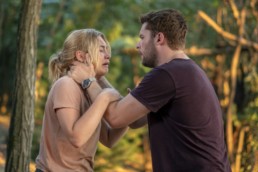‘Midsommar’ Is Here to Scare the Daylights Out of You
'Hereditary' may have put Ari Aster on the map, but 'Midsommar' solidifies him as the new king of horror.
Before I start writing any film review, I like to listen to music that reflects the tone of the film so I can reorient myself back into the fictional world of the movie. While I didn’t find the official soundtrack for Midsommar anywhere online, I did find a Spotify playlist called “Midsommarmorgon,” which felt like the universe wanted me specifically to listen to it (“morgon,” phonetically similar to “Morgan,” means “morning” in Swedish).
An innocent enough coincidence, undoubtedly. But after watching the visionary horror film Midsommar, you find that even unquestioned assumptions can hide dark and deadly truths.
A surrealist drama based on heartbreak and psychotic unraveling, Midsommar is edge of your seat horror at its best. After Dani (Florence Pugh) receives unexpected news of a family tragedy, she turns to her emotionally unavailable boyfriend Christian (Jack Reynor) for support. More so out of guilt than good intention, he haphazardly invites her to join his upcoming boys trip to rural Sweden, planned by their mutual friend, Pelle (Vilhelm Blomgren). Hesitant, but ultimately agreeing to go, Dani finds herself in a remote Swedish village celebrating “Midsommar,” a week-long festival and tradition that brings together members of a small, off-the-grid community, who gather to reflect and pay homage to their ancestors.
The blonde-haired, blue-eyed Swedes welcome Dani, Christian, and their friends Josh (William Jackson Harper) and Mark (Will Poulter) with open arms. Like a scene from a folklore fairytale, the vibrancy of the natural surroundings and their matching ancestral garb, paired with the seasonal occurrence of 24-hour sunlight, squash most initial feelings of uneasiness. Not all, but most. Dani struggles to strengthen her connection with Christian during the trip, which seems to get better when they endure the rituals of the festival together. However, as the gatherings turn darker and alarmingly more deranged, the group soon discovers that the festival masks a much more harrowing and threatening experience.
Midsommar is another grand slam for the beloved A24 production company, as well as director Ari Aster & all involved. It’s Florence Pugh as the terror-induced Dani who carries the weight of the film, and whose blood-curdling screams rival that of Toni Collette’s in Aster’s breakout directorial debut, Hereditary. Midsommar accomplishes great visual moments as well; the cinematography soars and glides so seamlessly that it feels like a VR experience, and psychedelic drug trips are so visceral that they feel like extended sequences of Gaspar Noé’s recent horror-hallucination film, Climax.
Now, the question on everyone’s mind: how does Midsommar compare to Hereditary? I’d say the answer is complicated. If you’re looking for more subtle psychological torture, you may find Midsommar to be too grandiose (at 2 hours and 20 minutes, it’s certainly a challenging amount of excessive violence to bear). However, the world Aster imagines in this isolated commune is achingly beautiful, only made better by empowering our young female heroine. So while Hereditary may have put indie director Ari Aster on the map, Midsommar solidifies him as the current king of horror.
Day or night, it doesn’t matter when you watch Midsommar: the slow-building tension creates energy so palpable it will do more than give you chills, which I can attest to, as I actually had a nightmare the night after watching. So I’ll probably need to wait to watch this one again, as well as pause on listening to that Spotify playlist – for now.
Morgan Rojas
Certified fresh. For disclosure purposes, Morgan currently runs PR at PRETTYBIRD and Ventureland.


